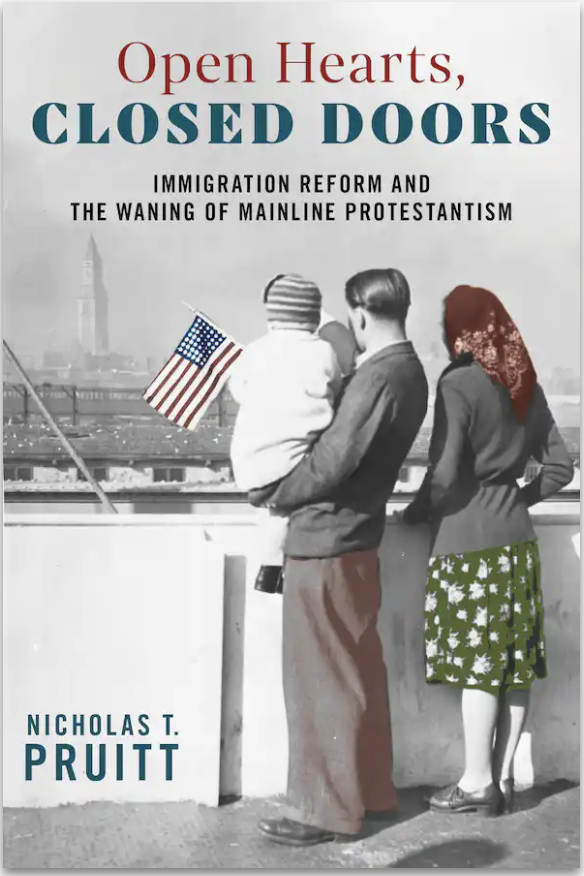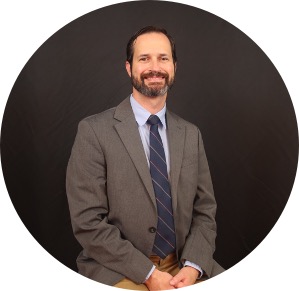
Open Hearts, Closed Doors: Immigration Reform and the Waning of Mainline Protestantism
Nicholas Pruitt
The following is a modified excerpt from Nicholas Pruitt’s Open Hearts, Closed Doors (2021), used with permission from New York University Press.
At the outset of the twentieth century, white Protestants still held a tight grasp on the cultural and social resources of the United States. Public school classrooms began each day with largely Protestant prayers, local stores closed on Sundays, national political leaders touted the centrality of Christian ideals to American identity, and an expanding overseas empire aimed to extend the reach of Christian civilization. For many Americans, such religious aspirations blended seamlessly with American cultural norms of personal enterprise, a shared English language, and democratic principles. This boldly Protestant orientation would not last.

As the twenty-first century unfolds, Protestants still hold a disproportionate amount of power, but schools no longer expect prayer from their students and it is now common to see a mosque or Hindu temple along the highway. Even long-standing Protestant denominations have surrendered much of their power to newer evangelical groups and coalitions. While Protestants still claimed a majority of seats in the 116th U.S. Congress (convened in 2019), the 163 Catholic, 34 Jewish, ten Mormon, five Orthodox Christian, three Hindu, three Muslim, and two Buddhist members of Congress showed a more apparent diversity. Scholars and pundits alike acknowledge the role more recent immigration has played in redefining America’s cultural and social identity. Robert P. Jones’s 2016 book The End of White Christian America examines such trends and draws attention to demographic shifts, both racial and religious, that are occurring in the United States. Twelve years earlier, political theorist Samuel P. Huntington went so far as to lament these same developments in his book Who Are We? No matter how one interprets these changes, the social and cultural landscape of the early twenty-first century United States is much more diverse than it was a century earlier.
This coming change was not evident to the Protestant figures and politicians who gathered at a 1961 consultation to discuss immigration policy. Religious leaders representing most mainline Protestant denominations met with key policymakers in Washington, DC for two days to discuss immigration reform. Attendees believed the nation’s immigration policy during the last four decades had enforced forms of racial discrimination that favored some nationalities over others. These liberal Protestants joined a chorus of voices at the time calling for the dismantling of the national origins system, thus allowing for more diverse groups of people to enter the country. Despite the pushback they would receive from their more conservative constituents, those in attendance were convinced that the nation could maintain a Christian identity while still tolerating the cultural diversity that accompanied immigration. Many in attendance also believed that the Cold War demanded liberal reform in order to distance the United States from the godless totalitarianism practiced in the Soviet Union. The themes of Protestant relief and Cold War concerns all converged in an endorsement the delegates received while at the 1961 conference. “Consultations such as this focus attention upon an issue that is important to both our international standing and our national self-respect,” declared President John F. Kennedy in a statement sent to the gathering. “You who assume the daily burden of guiding the oppressed and the orphaned people of the world to productive and satisfying lives under the banner of freedom deserve our thanks.”
Four years later, the Immigration and Nationality Act overturned in large part a restrictive immigration system put in place 40 years earlier that discriminated on the basis of race and national origins. This watershed moment helped to unsettle the white Protestant hegemony which had held sway for most of the nation’s history. What was once a nation whose leaders were steeped in Anglo-Protestant culture slowly came to accept forms of multiculturalism and provide opportunities for other ethnic, racial, and religious groups to participate in American political and social institutions, though much work remains. This book delineates the ways in which mainline Protestants in the United States from 1924 to 1965 facilitated and helped to define such pluralism as they responded to immigrants and refugees through home missions (Christian initiatives that stress evangelism and social work) and political lobbying. During these four decades, Protestants made many largely overlooked contributions to the national debate over immigration policy, yet their positions would have unintended consequences. Mainline Protestant leaders joined the drive for mid-century immigration reform, and in the process paved the way for a more plural nation. Their denominations tried to balance a limited form of pluralism and respect for cultural diversity with the conviction that America should be a Protestant nation centered on biblical tenets and church attendance; in short, they came to a pluralistic bargain. In so doing, they contributed to their own decline as cultural gatekeepers and aided in immigration reform that allowed for a cultural revolution as non-Western immigration changed the cultural and religious landscape of the nation.

President Lyndon B. Johnson signs the Immigration Act of 1965 as Vice President Hubert Humphrey, Lady Bird Johnson, Muriel Humphrey, Sen. Edward (Ted) Kennedy, Sen. Robert F. Kennedy, and others look on. / Liberty Island, New York / October 3, 1965/ Wikimedia Commons.
Mainline Protestants, a collective label applied to numerically predominant, largely white denominations driven by ecumenism, began the twentieth century by maintaining a cultural prominence inherited from their nineteenth-century predecessors. During the early to mid-twentieth century, they retained their cultural clout and worked to preserve an American Protestant consensus despite rising pluralism. Nativist and assimilationist impulses remained patent among American Protestants, but these dispositions were tempered by home missions, mid-century sensibilities, and internationalist views. Mainline leaders aimed to confront long-standing racial prejudice among their members and incorporate diverse immigrant groups into their churches.
Global events, such as World War II and the Cold War, also inspired more liberal Protestants to criticize immigration restriction during this time, and even to sponsor refugee resettlement. Melding their cosmopolitan ideals with postwar sensibilities, Protestant luminaries including Sidney Gulick, Walter Van Kirk, G. Bromley Oxnam, Thelma Stevens, and Francis B. Sayre, Jr., worked to overturn Asian exclusion and, by the 1950s, to challenge discriminatory quotas that had been applied to eastern and southern Europeans since 1924. Such efforts often put liberal, ecumenical figures at odds with more conservative Christians, Protestant fundamentalists, and anti-communist crusaders. Yet these Protestant dignitaries did not necessarily call for increased immigration, but for a more equal system. Through frequent communication with political representatives and testimony before congressional committee hearings, they advocated a more liberal immigration policy and encouraged postwar refugee resettlement, largely through the work of Church World Service, an ecumenical, mainline organization that led the way in coordinating Protestant refugee relief efforts following World War II. Mainline Protestant leaders rode the wave of progressive momentum fostered by the New Deal, the civil rights movement, and the Great Society programs of President Lyndon B. Johnson and embodied the political liberalism and internationalist spirit of their time, despite the reservations of more conservative church members. By 1965, mainline Protestant groups were helping lead the charge for immigration reform; their hopes came to fruition later that year when President Johnson signed the Hart-Celler Act, which overturned the quota system premised on national origins.
As they witnessed increasing national diversity, mainline Protestants worked to shed the vestiges of virulent nativism from the prior century. They largely sought to confront their nativist demons by promoting cosmopolitanism and eventually a moderate form of cultural pluralism, rather than embracing religious pluralism. They hoped to challenge systemic racism and ever-present xenophobia while maintaining their dominance of American society. But in their embrace of diversity, mainline Protestants inadvertently helped to foster both cultural and religious pluralism. By the end of the twentieth century, mainline Protestants simply could not support cultural diversity and still effectively maintain a religiously uniform nation. The pluralistic bargain thus helped bring to an end more than three centuries of white Protestant hegemony in American society.
The Immigration Act of 1924 had placed heavy restrictions, in the form of quotas, on southern and eastern European groups in an effort to curtail the rising number of “new” immigrants who began coming to America during the late nineteenth century, a demographic that was largely Catholic and Jewish, as opposed to the largely Protestant “old” immigrants who arrived from northern Europe earlier during the nineteenth century. Though their overall numbers declined, people from overseas still entered the United States under the new law, and others made it into America undocumented. The 1924 legislation did not apply the quota system to immigration from the Western Hemisphere, except for European colonial possessions, and during the 1940s, ’50s, and ’60s, when the United States opened its borders to short-term contract laborers from Mexico known as braceros; Europeans displaced by the upheaval of World War II; previously excluded Asian immigrants; and refugees fleeing political turmoil during the Cold War. America’s growing role in international relations only compounded the issues raised by people of various nationalities migrating to the United States. In addition, millions of immigrants who had already come to the United States since the late nineteenth century continued to settle into their new American surroundings. These immigrants from prior years continued to speak foreign languages and practice foreign cultures while putting down roots in American neighborhoods. Additional people also arrived from other lands, albeit in limited numbers.
Caught in the midst of these changes were Anglo-Protestants who had long worked to define the contours of American culture. When historians assess the ways in which Protestants regarded immigrants, they usually focus on efforts to assimilate them during the late nineteenth and early twentieth centuries and Protestant support for restriction leading up to 1924. According to the standard timeline, concerned Christians hoped to integrate the “foreigner” into American society through evangelization and assimilation, only to find by the 1920s that this approach was not working. As this line of interpretation goes, white Protestants then began to support immigration restriction, thus reflecting the nativist inclinations of American society at large that were codified in the legislation Congress passed during the 1920s. But this narrative abruptly ends in 1924, failing to account for subsequent Protestant attention to immigrants. This book sheds light on the largely unknown story of mainline Protestants during the following years who advocated for cultural diversity and a more just immigration policy, while still grasping a narrowly defined Protestant and American vision for the nation. ♦

Nicholas T. Pruitt is an Associate Professor of History at Eastern Nazarene College in Quincy, Massachusetts. His work explores the connections between U.S. religion, culture, and politics during the twentieth century.
Recommended Citation
Pruitt, Nicholas. “Open Hearts, Closed Doors: Immigration Reform and the Waning of Mainline Protestantism.” Canopy Forum, November 30, 2022. https://canopyforum.org/2022/11/30/open-hearts-closed-doors-immigration-reform–and-the-waning-of-mainline-protestantism/.

